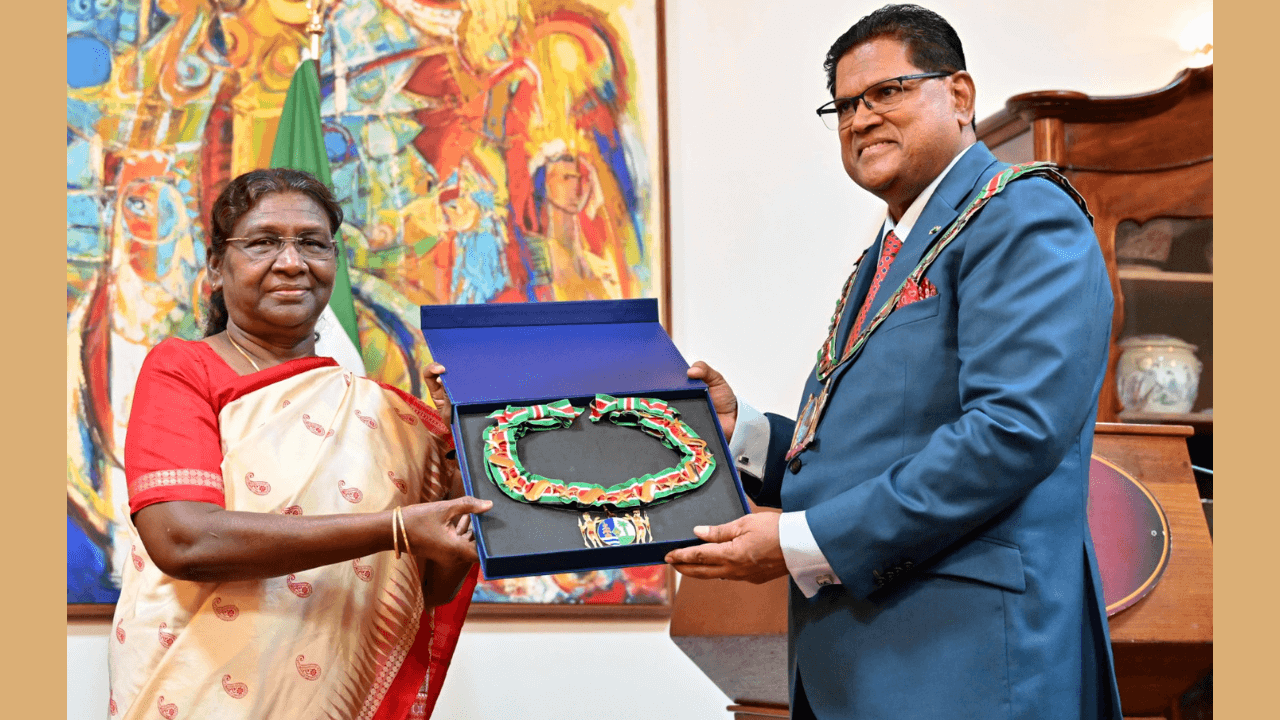President Droupadi Murmu Conferred with Suriname’s Highest Civilian Award
President Droupadi Murmu has made history by becoming the first Indian to receive the prestigious Grand Order of the Chain of the Yellow Star, which is Suriname’s highest civilian award. President Chandrikapersad Santokhi of the Republic of Suriname presented her with this honor as a tribute to the deep-rooted ties between the two nations. President Murmu graciously dedicated the award to future generations of the Indian-Surinamese community.
President Droupadi Murmu’s Visit to Suriname
During her official visit to Serbia and Suriname, President Murmu arrived in Paramaribo, the capital of Suriname, on June 4. This three-day state visit holds great significance as it marks President Murmu’s first visit to Suriname since assuming office in July of the previous year.
- President Murmu expressed deep honor and gratitude upon receiving Suriname’s highest distinction. She acknowledged the significance of this recognition, not just for herself, but also for the 1.4 billion people of India whom she represents.
- In a tweet, she dedicated the honor to the successive generations of the Indian-Surinamese community, recognizing their invaluable contribution to strengthening the bond between the two nations.
- During her visit to Paramaribo, President Murmu took time out of her busy schedule to spend time with a group of children and gifted them chocolates made in India.
- She also visited ‘Marinetrap,’ witnessing the simulation and welcoming of the First Indians’ arrival in Suriname 150 years ago.
- Additionally, she inaugurated the simulated village at Independence Square.
- President Murmu had a meeting with her Surinamese counterpart, President Chandrikapersad Santokhi, and led delegation-level talks.
- Several Memoranda of Understanding (MoUs) were signed in areas such as health, agriculture, and capacity building, aiming to enhance bilateral cooperation between India and Suriname. These agreements were the result of fruitful discussions between President Murmu and President Santokhi.
- During the talks, President Murmu emphasized the significance of the historical and cultural ties that form the foundation of the multifaceted and modern partnership between India and Suriname.
- She noted that bilateral trade has room for growth and expressed the need for collaborative efforts to expand trade for mutual benefit.
- The President expressed confidence that the signed agreements would help boost trade and economic ties between the two countries.
- Furthermore, President Murmu highlighted the potential for collaboration in sectors such as pharmaceuticals, Ayurveda, agriculture, and defense.
- She assured Suriname of India’s commitment to providing technical cooperation and contributing to capacity-building and skill development according to Suriname’s requirements.
About the Suriname’s Highest Civilian Award
The highest civilian award in Suriname is the Grand Order of the Chain of the Yellow Star (Dutch: Grootlint in de Orde van de Gele Ster).
- It is awarded by the President of Suriname to individuals who have made outstanding contributions to the country in the fields of politics, science, the arts, or other areas of public service.
- The award was established in 1975, shortly after Suriname gained independence from the Netherlands.
- It is a collar order, consisting of a yellow star with five points, surrounded by a chain of yellow stars. The star is worn on a sash over the right shoulder.
- The Grand Order of the Chain of the Yellow Star is a very prestigious award, and it is only awarded to a select few individuals each year.
Also Read
- PM Narendra Modi conferred with Papua New Guinea and Fiji’s Highest Honours
- Tata Sons Chairman N Chandrasekaran Conferred With France’s Highest Civilian Award
- Ratan Tata Receives the Order of Australia, the Highest Civil Honour of the Country
- 3 August Current Affairs 2023 in English
- MoU Between Subroto Mukerjee Sports and Education Society and All India Football Federation (AIFF) to Promote Football at Grassroot Level
- Dr. Mansukh Mandaviya Delivers Keynote Address at the 13th Indian Organ Donation Day ceremony
- Education Ministry Forms Expert Panel on Anti-Discrimination in Higher Education
- Concerns Arise Over Cheetah Deaths at Kuno National Park
FAQs
President Droupadi Murmu belongs to which tribal community?
President Murmu was born in a poor Santhal family in Mayurbhanj district, Odisha. She faced many hardships in her early life, but she was able to overcome them and achieve great success. She is the first person from a tribal community to be elected President of India.
When did Suriname get independence?
Suriname was first inhabited by Amerindians, who were later joined by Europeans, Africans, and East Indians. In 1667, the Dutch took control of Suriname from the English. The Dutch ruled Suriname as a plantation colony, and the country’s economy was based on the export of sugar, coffee, and cocoa.
